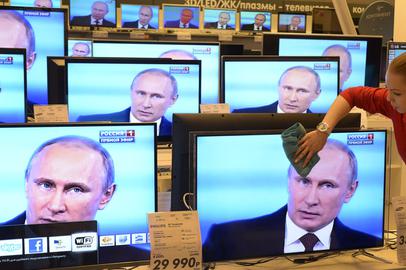Almost 17 million people have contracted the novel coronavirus since it emerged. Nearly six million people are still sick with the virus, while the rest of the world is just sick of it. A race for the vaccine has begun among universities, companies, and scientists to find what must be the most sought after vaccine of the 21st century.
Countries are also entering the competition. One of them is Russia, which several Western countries have now accused of hacking medical trials. According to an article by the Associated Press, the United States, United Kingdom, and Canada all claim to be under attack from the hacking group APT29 or Cozy Bear, which became famous when they were implicated in the infilttration of Democratic Party email accounts during the 2016 presidential election.
British Foreign Secretary Dominic Raab has been quoted as saying “It is completely unacceptable that the Russian Intelligence Services are targeting those working to combat the coronavirus pandemic.”
It is not the first time attacks linked to the pandemic have been reported. Recently the US government also claimed that China was behind a similar attack. It is, however, the first time during the pandemic where a specific hacking group has been mentioned, as well as the software it used to break through to Western-led research on Covid-19.
Echoes of the Space Race
Most people will have heard the names Neil Armstrong, Buzz Aldrin and the space dog Leika, the famous real-life characters in the space race. It concluded with the moon landing in July 1969 after years of huge investments, espionage and intrigue. Another relatively recent battle, the nuclear arms race, also came to an end when the US and Russia agreed to downscale their stockpiles of nuclear warheads.
The pandemic has offered up a new competitive race. Who will be the first to provide the world with a vaccine?
Russia has previously pushed the narrative that it is handling the pandemic flawlessly — just as Chinese officials have claimed about China — while blaming Europe and the US for the virus. Initially, both China and Russia sent out big shipments to help countries hit by the pandemic, parading themselves as saviors.
So in this regard, finding a vaccine would be a great win for Russia. This could also explain why it has already claimed to be the first country in the world to have completed the first phase of testing a vaccine on humans. It’s not entirely true, though. When Russia reported these first tests on humans, this information was not confirmed to be accurate, and even if it had been, it would not have been the first country in the world to test on humans.
Medical teams at Washington Health Research Institute in Seattle reportedly completed the first phase of testing back in March. According to the World Health Organization, it is now at phase two of testing.
Speaking of the States
Russia and the US have also been in a bitter back and forth battle about whether or not Russia has been publishing disinformation about the ongoing pandemic in the US. As an Associated Press report explains, US officials have accused Russia of spearheading English-language sites to spread disinformation and “exploit a crisis that America is struggling to contain ahead of the presidential election in November.”
Unsurprisingly, the spokesperson for President Putin, Dmitry Peskov, has denied these accusations, dismissing them as a “persistent phobia.”
“Russian media actively work to cover the situation with the coronavirus. Indeed, when it comes to Russia, it is going through this difficult time better than many other countries, albeit not without problems. Indeed, all the media point to considerable problems that the United States is experiencing during this period,” Peskov said.
The US is indeed facing problems handling the coronavirus. Still, it is also true that Russia is spreading disinformation. It is undeniable that misleading, false, and inadequate information has been publicized on Russian news sites. It might be hard to prove that the Kremlin is running the show, but whether or not disinformation has been spread from Russia or by Russian entities is not really up for discussion.
Almost Naked Nurses
Not all disinformation comes from Russia. Some of it is also about Russia. For example, a bizarre story involving Russian nurses has been doing the rounds on social media and the internet. A photograph showing a nurse in transparent personal protection equipment wearing nothing else but underwear has surfaced, fueling the rumor that Russian nurses work in the nude.
However, according to a fact-checking exercise conducted by AFP it is, unsurprisingly, not common practice in Russia to have almost naked nurses tending to patients. That particular nurse apparently felt stifling and hot under the PPE and decided to go for less formal attire. She was also reprimanded by her managers for the decision. Luckily for her, as she told reporters, she also got offered a modeling contract as a result of the photograph in question.
Whether it’s an amusing story or something more sinister such as cheating to gain ground in the all-important vaccine race, disinformation is on the rise, and Russia is certainly a key player in the battle.
Also in this series:
Missing Data, Mud-Slinging and “Miracle Cures”: Why Disinformation Is Bad For Your Health
Iranian Online Network Still Peddling Coronavirus Disinformation
Putin’s Domestic Problems Eclipse Russian Disinformation Campaigns
China's Campaign to Protect President Xi against Coronavirus Criticism
Chinese Embassies Work Overtime to Diffuse International Fury Over Coronavirus
Russia Bans Coronavirus "Fake News" and Slams US Over Press Freedom
China Blocks Investigations Amid Refusal to Shut Down Wet Markets
From Coronavirus to the Second World War: On the Frontlines of the Russian Disinformation Battle
Russia Blames West for Propaganda While Reporting Unlikely Number of Covid-19 Deaths
As Criticism of China Falters, Time for a NATO for Human Rights?
Guest Post From Russia: How do You Put the Brakes on a Fake News Machine?
Has China Really Given Assent to a Global Coronavirus Review?
Russian Disinformation Back to Targeting Ukraine as Putin Declares Covid-19 Peak has Passed
Will the Post-Coronavirus World Stand Up to China's Bullying Business Tactics?
Coronavirus: An Opportunity to Advance Russian Interests in Latin America
The Shi Zhengli Identification Criteria: How Do We Know Where Coronavirus First Emerged?
Covid-19 and Black Lives Matter Unrest Targeted by Russian Disinformation
Occupy First, Talk Later: China Turns Border Conflict Into PR Opportunity
China Deploys Coercive Tactics to Deal with Disinformation Accusation
Putin Tries to Rewrite War History to Assert Russia's Position on the World Stage
Behind the Smokescreen: What are China’s Anti-EU Pandemic Narratives Really About?
Kremlin Has the Upper Hand as Covid-19 Puts Independent Media Under Pressure
As MH17 Trial Gets Under Way, Russian News Channels Muddy the Waters

























comments